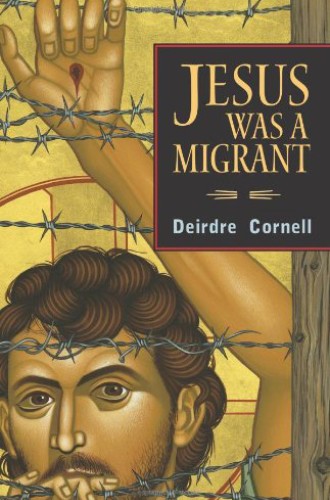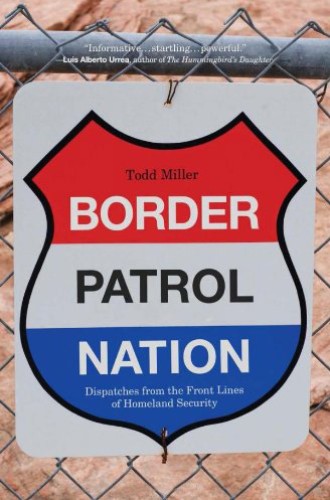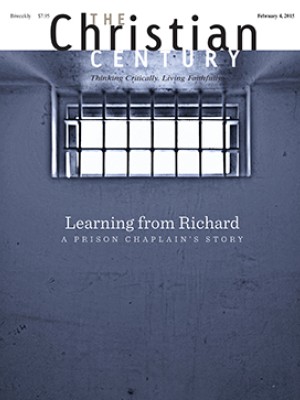Jesus Was a Migrant, by Deirdre Cornell, and Border Patrol Nation, by Todd Miller
How do immigrants shape Americans’ self-understanding? Are we citizens surrounded by terrorists and smugglers who are determined to gain a foothold among us and threaten our way of life? Or are we spiritual migrants on a journey of salvation, invited to share with and learn from companions who have experienced displacement? These are contrasting views of our national experience highlighted by Deirdre Cornell and Todd Miller in two books addressing our responses to migration. Cornell’s book is the fruit of 20 years of pastoral work with migrants and immigrants, mostly in New York State but also in Mexico. Miller is a journalist specializing in border issues who has also worked in immigration education and advocacy.
Cornell opens with attention to the historic relationship of Christian faith to human mobility, then takes readers through salvation history as a record of migrations both human and divine. She writes, “With all its hardships, human mobility serves as a paradigm of religious faith. Christians espouse belief in a Savior who embodied migration in his lifetime—and who continues to cross borders as the risen Lord. In migration, we find a source of blessing.” This insight, that migration is central to the human experience taken on and redeemed by Christ, provides the driving force for the book.
Read our latest issue or browse back issues.
What follows could be called a travelogue of Cornell’s journey alongside the migrants to whom she has provided pastoral care. A Christmas Eve trip south to celebrate with her immigrant godchildren and their family flows into a nuanced reading of the story of the Magi and a reflection on the role of outsiders in helping us to recognize God’s work in Jesus. She explores the experience of crossing over boundaries, encountering God in new ways, and returning, changed, to see the place of origin differently. It is not a facile comparison; the experiences of her immigrant friends challenges traditional views of the Magi. The story of Matthew’s audience of diaspora Jews interprets the memories and longings of Cornell’s friends, and finally the visit becomes the seed for change in Cornell’s own family: “From that moment on, I knew we could not go home the same way. . . . Maybe I had unconsciously assumed that we were bringing the church to migrants when it was they who also freely shared the church with us.” She lets the text speak into her life while she draws on her own experiences to understand the text.
Cornell also contemplates the interplay of traditional elements of Roman Catholic piety with the lives of migrants who practice them. These sections are strong in beauty and depth, but they may not all resonate with readers outside the Catholic tradition. The chapter in which a migrant named José finds comfort in praying Psalm 88 during his detention and eventually writes psalmlike words of praise as an expression of his maturing faith is a perfect invitation to pray with the psalms. It is also a path to empathy with a life experience very different from my own.
“Pure Grace” is the title of the final chapter, in which Cornell presents a vision for the church as a community of welcome and support. Really the whole book is marked by grace. The grace of a God who moves among God’s people. The grace of perseverance through all kinds of trials. The grace of standing up, together, against injustice. The grace of migrants and welcoming communities mutually transformed. This grace isn’t just about being saved and getting to heaven, or about enacting favorable policies, pro-immigration or otherwise. It is a grace that means standing in the midst of human struggles, making unlikely connections with God and others, and finding a way forward.
Miller’s Border Patrol Nation approaches the realities of human migration from a very different angle, sounding the alarm about the growing size, reach, and militarization of the U.S. Border Patrol and the broader interests it represents. In each chapter, Miller discusses one example of the Border Patrol’s overall operations, including youth programming in El Paso, a trade show for high-tech surveillance equipment developers, one officer’s apparently unjust firing, and collaborative efforts with the border police of the Dominican Republic. Through these stories, Miller builds his case that the Border Patrol is a vast misuse of resources and that it is becoming a threat to freedom for undocumented residents, for U.S. citizens, and for people around the globe.
Whereas Cornell’s tone is warm and engaging, Miller’s borders on hysteria. He continually uses the phrase “as if” to jump from actual observations to his own commentary. When Border Patrol agents do a spot check for documentation on a bus, Miller writes, a passenger “looks at them as if this idea of a domestic security checkpoint was something that she had only seen in some movie about World War II but had suddenly become real.” In spite of the tone of Miller’s writing, it is worthwhile to encounter his thesis and consider how we might respond. The alarming facts he presents and the evolving American attitude toward immigrants and surveillance are real.
These two books complement each other well. Miller’s reporting gives context to the struggles of Cornell and her migrant friends. Border Patrol Nation also makes clear how commercialism and militarism play out in and distort the dynamics of human migration. But Miller flounders in his attempt to offer an alternative vision. He points to acts of civil disobedience to interrupt deportations, and he urges advocacy and hospitality, but he has no solid ground of hope to offer.
Where Border Patrol Nation falls short, Jesus Was a Migrant shines most brightly. The ground of hope, for migrants and for all humanity, is the redeeming grace of God enacted by Jesus Christ, who was himself a migrant. In interconnected stories of God’s pilgrim people and a faithful God, Cornell proclaims the good news that God seeks out, travels with, and guides wandering people and will at last bring about God’s kingdom where all are at home and at rest.







